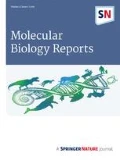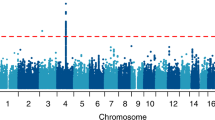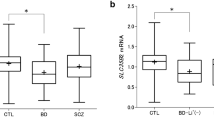Abstract
Serotoninergic system is one of the most important neurotransmission systems investigated in the field of psychiatry. Extensive evidence reveals how alterations of this system, and especially of the SLC6A4 gene, may be associated with psychiatric disorders. In this study we aimed to evaluate the pleiotropic nature of SLC6A4 alterations and their association with the overall risk of brain diseases rather than disorder-specific. SLC6A4 variants, namely 5HTTLPR, STin2, rs2066713, rs25531, rs4251417, rs6354 and rs7224199 were investigated in 4 independent cohorts of subjects with specific psychiatric disorders, including Alcohol dependence disorder (ALC), Alzheimer disease (ALZ), Schizophrenia (SCZ) and Bipolar disorder (BPD). Other variables (biochemical parameters and Psychiatric scales scores) were also tested for association. SLC6A4 polymorphisms are not associated with the risk of developing major psychiatric disorders (SCZ and BPD); however some signals were detected in ALC (HTTLPR pd = 9.25 × 10−03, pr = 7.24 × 10−03; rs2066713 pd = 6.35 × 10−08; rs25531 pd = 2.95 × 10−02; rs4251417 pd = 2.46 × 10−03), and ALZ (rs6354 pr = 1.22 × 10−02; rs7224199 pd = 1.00 × 10−08, pr = 2.65 × 10−02) cohorts. Some associations were also observed on exploratory analyses. Our findings did not reveal any major influence on SCZ and BPD development; On the other hand, some alteration of the SLC6A4 sequence were associated with an increased risk of ALC and ALZ disorders, suggesting common pathways. The results of this study should be carefully interpreted since it suffers of some inherent limitations (e.g. cohort size, slight ethnic heterogeneity). Further analyses may provide better detail on the molecular processes behind SLC6A4 alterations.



Similar content being viewed by others
Change history
22 January 2020
The following authors have double affiliations: <Emphasis Type="Bold">Stefania Boccia, Marco Di Nicola</Emphasis> and they should read
22 January 2020
The following authors have double affiliations: Stefania Boccia, Marco Di Nicola and they should read
References
Fuller RW (1996) Mechanisms and functions of serotonin neuronal systems: opportunities for neuropeptide interactions. Ann NY Acad Sci 780:176–184
Hensler JG, Artigas F, Bortolozzi A, Daws LC, De Deurwaerdere P, Milan L, Navailles S, Koek W (2013) Catecholamine/serotonin interactions: systems thinking for brain function and disease. Adv Pharmacol 68:167–197
Lesch KP, Merschdorf U (2000) Impulsivity, aggression, and serotonin: a molecular psychobiological perspective. Behav Sci Law 18(5):581–604
Linnoila VM, Virkkunen M (1992) Aggression, suicidality, and serotonin. J Clin Psychiatry 53(Suppl):46–51
Dell’Osso L, Carmassi C, Mucci F, Marazziti D (2016) Depression, serotonin and tryptophan. Curr Pharm Des 22(8):949–954
Mahmood T, Silverstone T (2001) Serotonin and bipolar disorder. J Affect Disord 66(1):1–11
Cross AJ (1990) Serotonin in Alzheimer-type dementia and other dementing illnesses. Ann NY Acad Sci 600:405–415 discussion 415-407
Gorwood P, Lanfumey L, Hamon M (2004) Alcohol dependence and polymorphisms of serotonin-related genes. Med Sci (Paris) 20(12):1132–1138
Calabro M, Fabbri C, Crisafulli C, Albani D, Forloni G, Kasper S, Sidoti A, Velardi E, Zohar J, Juven-Wetzler A, Souery D, Montgomery S, Mendlewicz J, Serretti A (2018) The serotonin transporter and the activity regulated cytoskeleton-associated protein genes in antidepressant response and resistance: 5-HTTLPR and other variants. Hum Psychopharmacol 33(6):e2682
Coplan JD, Gopinath S, Abdallah CG, Berry BR (2014) A neurobiological hypothesis of treatment-resistant depression - mechanisms for selective serotonin reuptake inhibitor non-efficacy. Front Behav Neurosci 8:189
Hofer P, Schosser A, Calati R, Serretti A, Massat I, Kocabas NA, Konstantinidis A, Mendlewicz J, Souery D, Zohar J, Juven-Wetzler A, Montgomery S, Kasper S (2016) The impact of serotonin receptor 1A and 2A gene polymorphisms and interactions on suicide attempt and suicide risk in depressed patients with insufficient response to treatment–a European multicentre study. Int Clin Psychopharmacol 31(1):1–7
Rotondo A, Mazzanti C, Dell’Osso L, Rucci P, Sullivan P, Bouanani S, Gonnelli C, Goldman D, Cassano GB (2002) Catechol o-methyltransferase, serotonin transporter, and tryptophan hydroxylase gene polymorphisms in bipolar disorder patients with and without comorbid panic disorder. Am J Psychiatry 159(1):23–29
Ho LW, Furlong RA, Rubinsztein JS, Walsh C, Paykel ES, Rubinsztein DC (2000) Genetic associations with clinical characteristics in bipolar affective disorder and recurrent unipolar depressive disorder. Am J Med Genet 96(1):36–42
Bevilacqua L, Goldman D (2011) Genetics of emotion. Trends Cogn Sci 15(9):401–408
Thompson MD, Kenna GA (2016) Variation in the serotonin transporter gene and alcoholism: risk and response to pharmacotherapy. Alcohol Alcohol 51(2):164–171
Nomura M, Kaneko M, Okuma Y, Nomura J, Kusumi I, Koyama T, Nomura Y (2015) Involvement of serotonin transporter gene polymorphisms (5-HTT) in impulsive behavior in the japanese population. PLoS ONE 10(3):e0119743
Albani D, Prato F, Tettamanti M, Lovati C, Galimberti D, Restelli I, Mariani C, Quadri PL, Scarpini E, Lucca U, Forloni G (2009) The serotonin transporter promoter polymorphic region is not a risk factor for Alzheimer’s disease related behavioral disturbances. J Alzheimers Dis 18(1):125–130
Prasad HC, Steiner JA, Sutcliffe JS, Blakely RD (2009) Enhanced activity of human serotonin transporter variants associated with autism. Philos Trans R Soc Lond B Biol Sci 364(1514):163–173
Rao S, Leung CS, Lam MH, Wing YK, Waye MM, Tsui SK (2017) Resequencing three candidate genes discovers seven potentially deleterious variants susceptibility to major depressive disorder and suicide attempts in Chinese. Gene 603:34–41
Shi M, Hu J, Dong X, Gao Y, An G, Liu W, Chen L, Sun X (2008) Association of unipolar depression with gene polymorphisms in the serotonergic pathways in Han Chinese. Acta Neuropsychiatr 20(3):139–144
Lesch KP, Bengel D, Heils A, Sabol SZ, Greenberg BD, Petri S, Benjamin J, Muller CR, Hamer DH, Murphy DL (1996) Association of anxiety-related traits with a polymorphism in the serotonin transporter gene regulatory region. Science 274(5292):1527–1531
Shiroma PR, Drews MS, Geske JR, Mrazek DA (2014) SLC6A4 polymorphisms and age of onset in late-life depression on treatment outcomes with citalopram: a sequenced treatment alternatives to relieve depression (STAR*D) report. Am J Geriatr Psychiatry 22(11):1140–1148
Kenna GA, Roder-Hanna N, Leggio L, Zywiak WH, Clifford J, Edwards S, Kenna JA, Shoaff J, Swift RM (2012) Association of the 5-HTT gene-linked promoter region (5-HTTLPR) polymorphism with psychiatric disorders: review of psychopathology and pharmacotherapy. Pharmacogenom Personal Med 5:19–35
Thompson MD, Kenna GA (2016) Variation in the serotonin transporter gene and alcoholism: risk and response to pharmacotherapy. Alcohol Alcohol (Oxford, Oxfordshire) 51(2):164–171
Stacey D, Cohen-Woods S, Toben C, Arolt V, Dannlowski U, Baune BT (2013) Evidence of increased risk for major depressive disorder in individuals homozygous for the high-expressing 5-HTTLPR/rs25531 (L(A)) allele of the serotonin transporter promoter. Psychiatr Genet 23(5):222–223
MacKenzie A, Quinn J (1999) A serotonin transporter gene intron 2 polymorphic region, correlated with affective disorders, has allele-dependent differential enhancer-like properties in the mouse embryo. Proc Natl Acad Sci USA 96(26):15251–15255
Drago A, Liappas I, Petio C, Albani D, Forloni G, Malitas P, Piperi C, Politis A, Tzavellas EO, Zisaki KK, Prato F, Batelli S, Polito L, De Ronchi D, Paparrigopoulos T, Kalofoutis A, Serretti A (2009) Epistasis between IL1A, IL1B, TNF, HTR2A, 5-HTTLPR and TPH2 variations does not impact alcohol dependence disorder features. Int J Environ Res Public Health 6(7):1980–1990
Serretti A, Olgiati P, Politis A, Malitas P, Albani D, Dusi S, Polito L, De Mauro S, Zisaki A, Piperi C, Liappas I, Stamouli E, Mailis A, Atti AR, Morri M, Ujkaj M, Batelli S, Forloni G, Soldatos CR, Papadimitriou GN, De Ronchi D, Kalofoutis A (2009) Lack of association between interleukin-1 alpha rs1800587 polymorphism and Alzheimer’s disease in two independent European samples. J Alzheimers Dis 16(1):181–187
De Ronchi D, Berardi D, Menchetti M, Ferrari G, Serretti A, Dalmonte E, Fratiglioni L (2005) Occurrence of cognitive impairment and dementia after the age of 60: a population-based study from Northern Italy. Dement Geriatr Cogn Disord 19(2–3):97–105
Folstein MF, Folstein SE, McHugh PR (1975) “Mini-mental state”. A practical method for grading the cognitive state of patients for the clinician. J Psychiatr Res 12(3):189–198
Alexopoulos GS, Abrams RC, Young RC, Shamoian CA (1988) Cornell scale for depression in dementia. Biol Psychiatry 23(3):271–284
Cummings JL, Mega M, Gray K, Rosenberg-Thompson S, Carusi DA, Gornbein J (1994) The Neuropsychiatric Inventory: comprehensive assessment of psychopathology in dementia. Neurology 44(12):2308–2314
Morris JC (1993) The clinical dementia rating (cdr): current version and scoring rules. Neurology 43(11):2412–2414
Roth M, Tym E, Mountjoy CQ, Huppert FA, Hendrie H, Verma S, Goddard R (1986) CAMDEX. A standardised instrument for the diagnosis of mental disorder in the elderly with special reference to the early detection of dementia. Br J Psychiatry 149:698–709
Corponi F, Bonassi S, Vieta E, Albani D, Frustaci A, Ducci G, Landi S, Boccia S, Serretti A, Fabbri C (2019) Genetic basis of psychopathological dimensions shared between schizophrenia and bipolar disorder. Prog Neuropsychopharmacol Biol Psychiatry 89:23–29
Barrett JC, Fry B, Maller J, Daly MJ (2005) Haploview: analysis and visualization of LD and haplotype maps. Bioinformatics 21(2):263–265
Porcelli S, Fabbri C, Serretti A (2012) Meta-analysis of serotonin transporter gene promoter polymorphism (5-HTTLPR) association with antidepressant efficacy. Eur Neuropsychopharmacol 22(4):239–258
Ho PS, Shih MC, Ma KH, Huang WS, Ho KK, Yen CH, Lu RB, Huang SY (2011) Availability of the serotonin transporter in patients with alcohol dependence. World J Biol Psychiatry 12(2):134–142
Wendland JR, Martin BJ, Kruse MR, Lesch KP, Murphy DL (2006) Simultaneous genotyping of four functional loci of human SLC6A4, with a reappraisal of 5-HTTLPR and rs25531. Mol Psychiatry 11(3):224–226
Kobiella A, Reimold M, Ulshofer DE, Ikonomidou VN, Vollmert C, Vollstadt-Klein S, Rietschel M, Reischl G, Heinz A, Smolka MN (2011) How the serotonin transporter 5-HTTLPR polymorphism influences amygdala function: the roles of in vivo serotonin transporter expression and amygdala structure. Transl Psychiatry 1:e37
Villalba K, Attonito J, Mendy A, Devieux JG, Gasana J, Dorak TM (2015) A meta-analysis of the associations between the SLC6A4 promoter polymorphism (5HTTLPR) and the risk for alcohol dependence. Psychiatr Genet 25(2):47–58
Yang J, Li MD (2014) Association and interaction analyses of 5-HT3 receptor and serotonin transporter genes with alcohol, cocaine, and nicotine dependence using the SAGE data. Hum Genet 133(7):905–918
Desmet FO, Hamroun D, Lalande M, Collod-Beroud G, Claustres M, Beroud C (2009) Human splicing finder: an online bioinformatics tool to predict splicing signals. Nucleic Acids Res 37(9):e67
Lam D, Ancelin ML, Ritchie K, Freak-Poli R, Saffery R, Ryan J (2018) Genotype-dependent associations between serotonin transporter gene (SLC6A4) DNA methylation and late-life depression. BMC Psychiatry 18(1):282
Janssen PK, Olivier B, Zwinderman AH, Waldinger MD (2014) Measurement errors in polymerase chain reaction are a confounding factor for a correct interpretation of 5-HTTLPR polymorphism effects on lifelong premature ejaculation: a critical analysis of a previously published meta-analysis of six studies. PLoS ONE 9(3):e88031
Yamazaki K, Yoshino Y, Mori T, Okita M, Yoshida T, Mori Y, Ozaki Y, Sao T, Iga J, Ueno S (2016) Association study and meta-analysis of polymorphisms, methylation profiles, and peripheral mrna expression of the serotonin transporter gene in patients with alzheimer’s disease. Dement Geriatr Cogn Disord 41(5–6):334–347
Dolan M, Anderson IM, Deakin JF (2001) Relationship between 5-HT function and impulsivity and aggression in male offenders with personality disorders. Br J Psychiatry 178:352–359
LeMarquand D, Pihl RO, Benkelfat C (1994) Serotonin and alcohol intake, abuse, and dependence: findings of animal studies. Biol Psychiatry 36(6):395–421
Border R, Johnson EC, Evans LM, Smolen A, Berley N, Sullivan PF, Keller MC (2019) No support for historical candidate gene or candidate gene-by-interaction hypotheses for major depression across multiple large samples. Am J Psychiatry 176(5):376–387
Cai N, Kendler KS, Flint J (2018) Minimal phenotyping yields GWAS hits of low specificity for major depression. BioRxiv. https://doi.org/10.1101/440735
Chen YC, Prescott CA, Walsh D, Patterson DG, Riley BP, Kendler KS, Kuo PH (2011) Different phenotypic and genotypic presentations in alcohol dependence: age at onset matters. J Stud Alcohol Drugs 72(5):752–762
Acknowledgements
We thank all patients who gave their consent for the analysis of their data.
Funding
None.
Author information
Authors and Affiliations
Contributions
All authors were actively involved in the design of the study, the analytical method of the study, the selection and review of all scientific content. All authors had full editorial control during the writing of the manuscript and finally approved it.
Corresponding author
Ethics declarations
Conflict of interest
The authors have no relevant affiliations or financial involvement with any organization or entity with a financial interest in or conflict with that can be associated with the subject matter discussed in this manuscript.
Ethical approval
The authors declare that all procedures followed were approved by the national ethical committee. Further, all patients gave their written consent for the analysis of their data.
Additional information
Publisher's Note
Springer Nature remains neutral with regard to jurisdictional claims in published maps and institutional affiliations.
Electronic supplementary material
Below is the link to the electronic supplementary material.
Rights and permissions
About this article
Cite this article
Calabrò, M., Mandelli, L., Crisafulli, C. et al. Psychiatric disorders and SLC6A4 gene variants: possible effects on alcohol dependence and alzheimer’s disease. Mol Biol Rep 47, 191–200 (2020). https://doi.org/10.1007/s11033-019-05119-5
Received:
Accepted:
Published:
Issue Date:
DOI: https://doi.org/10.1007/s11033-019-05119-5




